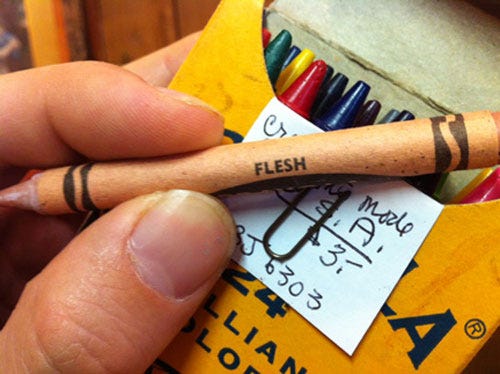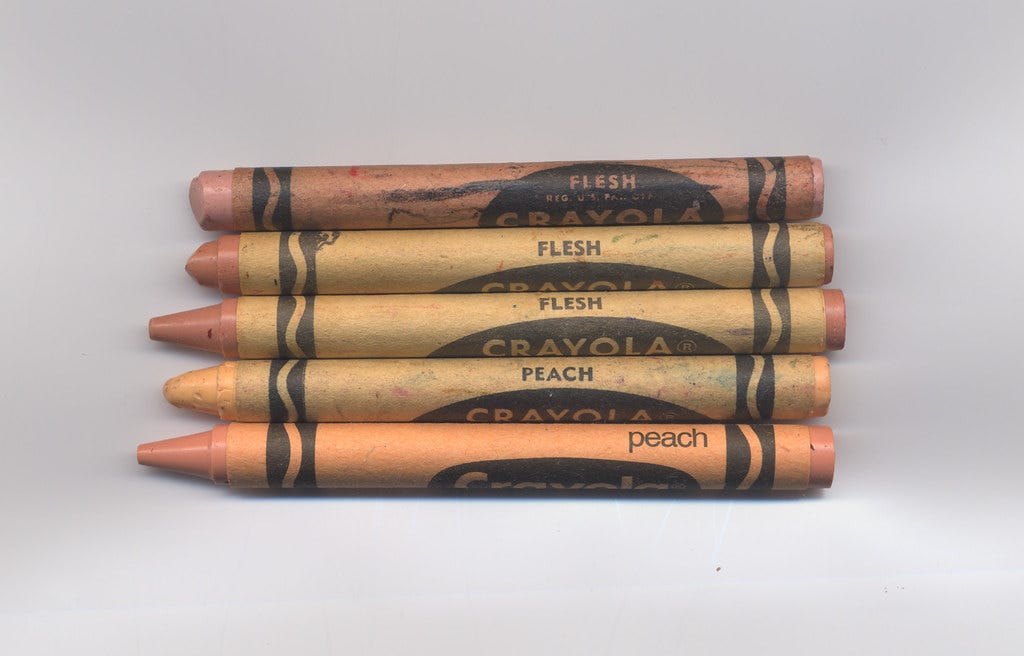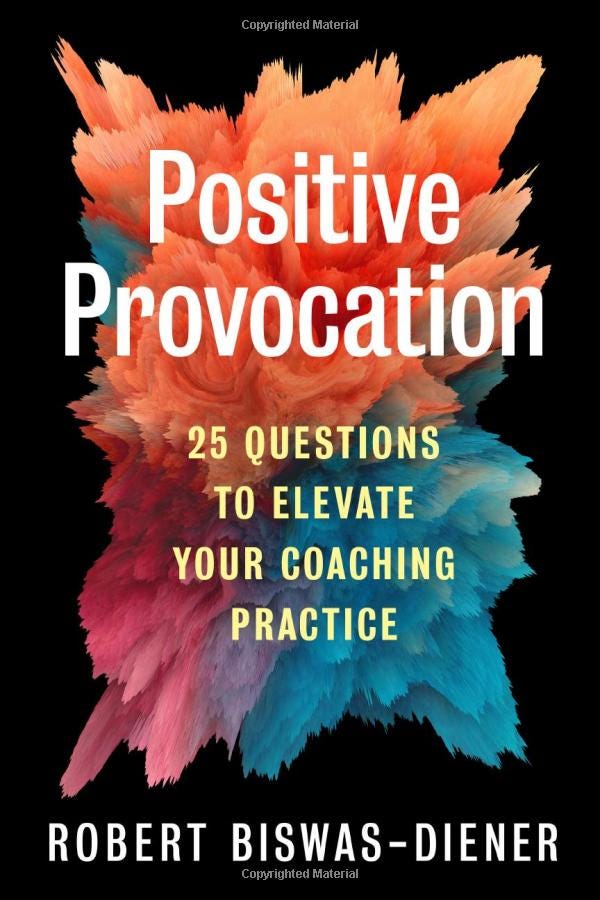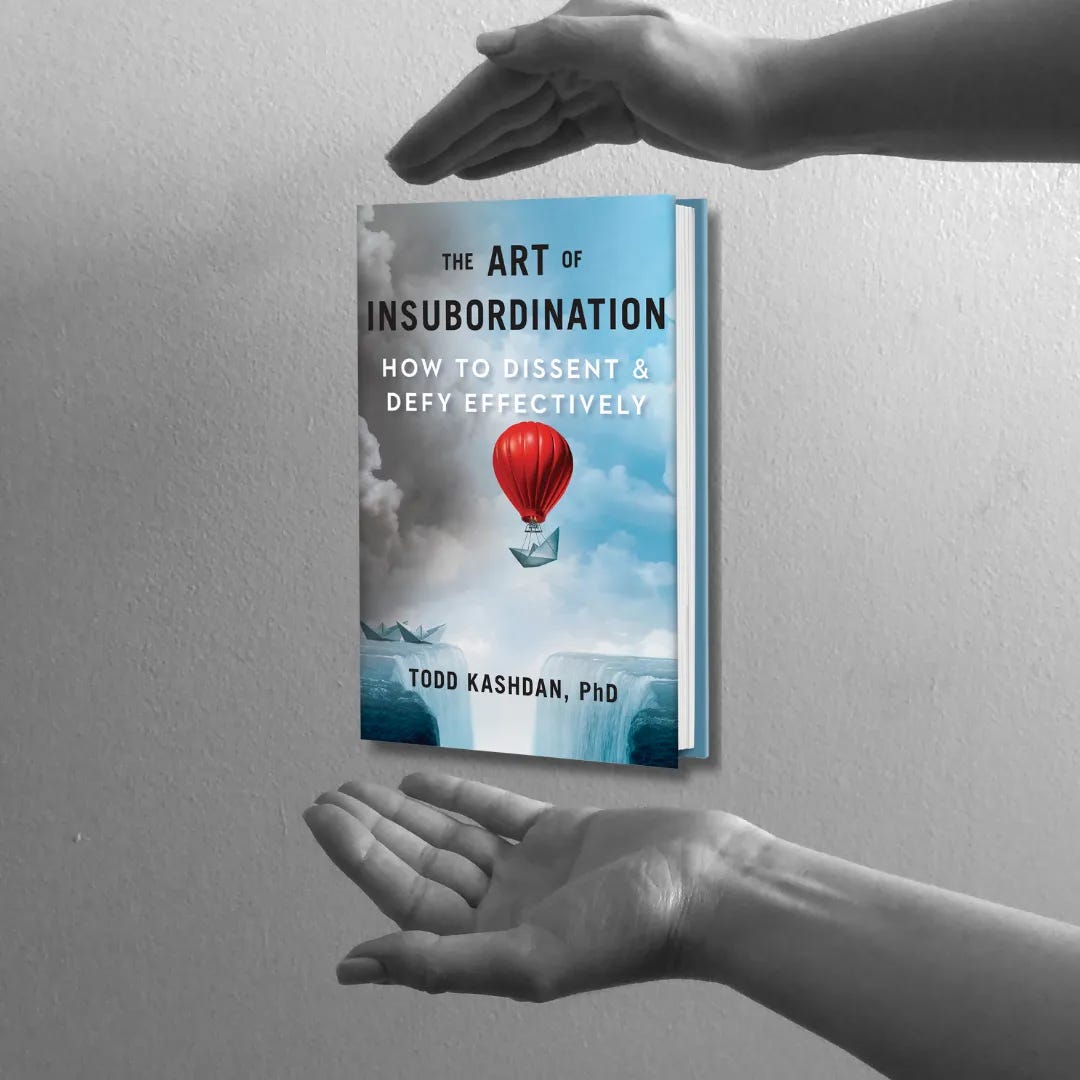If this is your first Provoked newsletter issue, learn more - here
Before I was born, Crayola had a singular idea about how to color a face.
As the apocryphal tale goes, a middle-level accountant in the company decided to get a corned beef and cabbage sandwich at a diner. Instead of reading a newspaper, they watched pedestrians pass by. Shocked, the guy ditched a barely touched meal, ran back to Crayola headquarters, and yelled, “Yo, yo, yo, get this, not all flesh is peach colored! We were wrong!” To which his senior manager responded, “We’re not admitting shit kid. We won’t apologize. What we will do is swap out Flesh for a Peach colored crayon. Problem solved, back to work.” It took three decades after this conversation in 1992, after far too many letters and phone calls from pissed off parents and teachers that Crayola released a batch of 8 skin hue colors.1
True or not, the color sins of Crayola reflect a common path to societal progress. Slow, systematic modifications in perceptions and behavior. Social shifts often leave a paper trail.
In 1962, 85% of American women believed it was a moral imperative for married couples to have children. This dropped to 43% in 1980.
For terminally ill patients, support for euthanasia increased from 62% in 1977 to 74% in 2016. However, assisted death is viewed as less morally justifiable in lower income countries.
In 1972, 90% of Americans were not just religious but specifically Christian. By 2020, this number dropped to 64%. The projection is that by 2070, less than half of the American population will be Christian. This fits with a broader trend of declining religious belief over time.
Taking Pride in Social Choices
Another emerging social trend is the decision of individuals to spend more time with self-chosen “family” over biological relatives. It makes sense if biological relatives refuse to accept and honor core features of your identity. Although anyone deciding that the presence of biological family hinders well-being knows a painful trade-off exists.
Hiding a part of your identity can simultaneously be emotionally taxing, protect against discrimination, and reduce supportive opportunities for wins and losses
Friendships receive scant attention when thinking about how relationships impact adulthood. We should not assume close family relationships are better if healthy alternatives exist. In fact, as we move past young adulthood, friend (not family) relationships become better predictors of health and happiness. As the cause of stress, friendships produce more pain. As the source of support, friendships produce a greater sense of belonging, joy and meaning.
There is a timing element here.
Know the core lesson of attachment styles - Foundations Are Not Fate.
Yes, your initial attachment style - that is, how uncomfortable you feel in the presence of others where rejection might arise and how much you avoid intimacy opportunities - originates during early childhood bonds. However, there is a potential undoing effect through initial romantic relationships and strong friendships. You get secondary chances to find security within a relationship and more importantly, within your self to seek and maintain them.
Instead of being pressurized to answer:
How can I improve relationships with my family and make them work?
Consider a better set of questions:
What kind of person do I want to be with?
Is this person helping me move toward an ideal version of myself?
As we change, some of our relationships provide insufficient space for these new versions of ourselves. Part of maturity is acknowledging what these relationships offer, and going elsewhere when there is an excessive accumulation of unmet needs, unsatisfactory interest, and unavailable support. Pay particular attention to the early warning system of someone who shows disinterest in your passionate pursuits and accomplishments,2 who is no longer rooting for you but instead views successes outside of the relationship as obstacles inside the relationship….
CODA
As humans uncover more about their own psychology, social shifts are inevitable. Resist the temptation to cling to a non-existent image of an idyllic, non-stressful time that never was.
While change is neither good nor bad on the surface, we should welcome deviations from ill-being and toxicity. We should be open to alterations in our social network with the goal of finding characters who support our needs and in turn, we support theirs. There is no reason that biological relatedness should be the determinant of social effort expenditure. Let this be a reminder - Give yourself the freedom to deviate and defy cultural expectations as needed.
Leave a comment and help others by detailing how you designed the perfect social circle (with imperfections intact). If you enjoyed this, please share and spread the word! Or click the heart button (always appreciated). Leave suggestions, constructive criticisms, and dare I say, a few positive words. Leave comments here or on LinkedIn or Instagram or Twitter.
Extra Curiosities
A member of my self-generated “family” just published a new book. He happens to be one of the most intelligent, creative, forward thinkers that I know. Positive Provocation: 25 Questions to Elevate Your Coaching Practice is fantastic. Crisp, short chapters that induce far more questions than answers. And if you are a coach or want to improve your intervention game, this is the type of book that offers another level. Maybe you are too wed to your training? Maybe you have stopped innovating and think you are a master coach/clinician? Consider this a test. Explore the chapters, each with their own deep question. Honestly, if this doesn't push you to think deeply about the craft, you need this book even more than imagined. I am not even a coach and I found that the questions elevated my approach to conversations.
For my tools, tactics, and strategies on deviating from cultural norms, check out my award-winning book, The Art of Insubordination: How to Dissent and Defy Effectively. Give a copy to a high school and college graduate!
Read Past Issues Here Including:
Who is The Loneliest Man Alive?
If this is your first Provoked newsletter issue, learn more - here Here’s the thing about loneliness, it is basically an evolved early warning system triggered when there is the potential danger of being alone. What does feeling lonely motivate you to do? Reconnect with others. From this perspective, while painful, loneliness is adaptive (for more on the…
Apricot, Black, Burnt Sienna, Mahogany, Peach, Sepia, Tan, and White.









Now that I am in my 70s, and most of my biological family have passed on, I often find myself using the words “ soul sister/brother” and daughter/son of my heart.” My friendships are platinum. Thanks again for another brilliant post reminding us love is love.